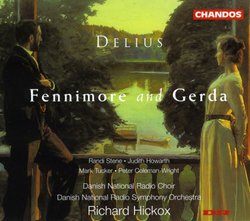| All Artists: Frederick Delius, Richard Hickox, Danish National Radio Symphony Orchestra, Randi Stene, Mark Tucker, Judith Howarth, Peter Coleman-Wright, Danish National Radio Choir Title: Delius - Fennimore and Gerda / Stene · Howarth · Tucker · Coleman-Wright · Hickox Members Wishing: 0 Total Copies: 0 Label: Chandos Release Date: 3/17/1998 Genre: Classical Styles: Opera & Classical Vocal, Historical Periods, Modern, 20th, & 21st Century Number of Discs: 1 SwapaCD Credits: 1 UPC: 095115958926 |
Search - Frederick Delius, Richard Hickox, Danish National Radio Symphony Orchestra :: Delius - Fennimore and Gerda / Stene · Howarth · Tucker · Coleman-Wright · Hickox
CD Details |
CD ReviewsGlorious, innovative opera with an odd ending... Eric D. Anderson | South Bend, IN United States | 03/12/2003 (4 out of 5 stars) "Delius believed this opera to be his best, and tried to break new ground with it's short, unsentimental, almost cinematic "pictures" replacing the typical dramtic structures of opera. In my opionion, it works wonderfully through most of the opera, and if he'd quit after picture nine, I'd annoint Fennimore and Gerda a masterpiece. One feels in these short scenes the pain of thwarted love, regret, artistic frustration, and guilt that the three main characters--Erik, Neils, and Fennimore--experience. Note that I didn't mention the titular character Gerda, and there's the rub. She doesn't even appear, actually isn't even mentioned until the final picture, where she arrives, without any introduction, and agrees to marry Niels. Hmmm.... It's odd, and anticlimactic. I understand that Delius wanted to end on a positive note, but he then should have given Gerda more dramatic weight, and more explanation of Niels' love for her and how it connects with his tortured love for Fennimore.All in all, though I'd recommend this work to any lover of late romantic opera. The music is strictly "five star", like everything I've yet heard from Delius. It's a great "listening opera", with Delius weaving his magical blend of Wagner's lyrical side (think "Forest Murmurs" and "Good Friday Music", not "Ride of the Valkyries", or "Siegfried's Funeral March") and Debussy. Despite the fact that Delius has been called "The English Impressionist", it's the Wagnerian echos that are the most startling. There's a strange sense of rapture in this music, and it makes up for any dramatic shortcomings." A Serendipitous Search for Happiness Cory | Virginia | 12/15/2007 (4 out of 5 stars) "If a second 'Anderson' is allowed to review this CD next to Eric's review, then I'll fill that vacancy.
First of all, it drives me nuts that this opera is in German. Delius' other operas, as far as I'm aware, are in English, and this opera would have been just as lovely in English. In fact, I usually buy an opera because it is in English. I understand that there is an English version of this opera available, so I'll be searching for that. Aside from the language barrier, I had no other qualms with the opera. The characters were believable, and the plot, though having the seeds of an orthodox tragedy of multiple, undecisive lovers, casts the characters in new shadows, especially Niels who maintains a likeable, introspective persona that doesn't collapse when all goes wry around him on two occasions in the opera. The plot is well developed, yet succinct. As for the conclusion of the opera, it merits further discussion. (I won't spoil what happens for those unfamiliar with the opera, just give my thoughts... though Erik's review gives a little more about the ending than my review does.) I completely support the decisions Delius made in the last two scenes (Delius wrote the libretto). The ending adds such a unique, optimistic twist on the traditional tragedy, that it really challenges the way we view conclusions to staged operas and our operas of life, that seem to have no way to happiness again. I'm quite convinced of the ending, because it speaks of reality: life goes on, and greater happinesses may await. The plots of our lives we see now that seem so complex and hopeless will by and large be irrelevant several years down the road, and the answers are very related and yet very unrelated to our present struggles. The opera's conclusion keeps in check our involvement in the previous nine scenes, and broadens our understanding of the characters beyond the immediate presentation. One must also wonder what turns have come in the life of Fennimore at the end. Likely as many as have affected Niels, but left unanswered. The music in the opera is some of Delius' best, as its not gushing like A Village Romeo and Juliet and other orchestral works, yet it involves a level of unparalleled seriousness and complexity without abandoning his characteristical lushness. Recording quality is superb, as are the vocalists and orchestra. The single CD includes 80 minutes worth of music, a protective box, and a sizeable booklet that includes notes on the opera, note on the performers, and the libretto in German, English, and French." |


 Track Listings (11) - Disc #1
Track Listings (11) - Disc #1